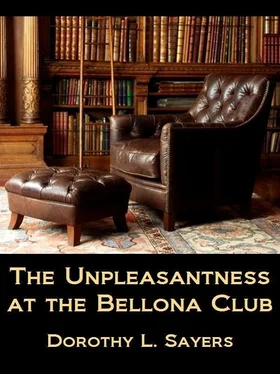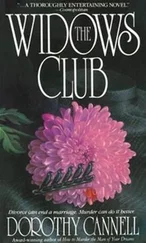“Have they been brushed?”
“No, my lord — only shaken out.”
This time Woodward offered no apology, having grasped dimly that polishing and brushing were not acts which called for approval under these unusual circumstances.
“You see,” said Wimsey, pausing for a moment to note an infinitesimally small ruffling of the threads on the left-hand trouser leg, “we might be able to get some sort of a clew from the dust on the clothes, if any — to show us where the General spent the night. If — to take a rather unlikely example — we were to find a lot of sawdust, for instance, we might suppose that he had been visiting a carpenter. Or a dead leaf might suggest a garden or a common, or something of that sort. While a cobweb might mean a wine-cellar, or — or a potting-shed — and so on. You see?”
“Yes, my lord” (rather doubtfully).
“You don’t happen to remember noticing that little tear — well, it’s hardly a tear — just a little roughness. It might have caught on a nail.”
“I can’t say I recollect it, my lord. But I might have overlooked it.”
“Of course. It’s probably of no importance. Well — lock the things up carefully. It’s just possible I might have to have the dust extracted and analyzed. Just a moment — Has anything been removed from these clothes? The pockets were emptied, I suppose?”
“Yes, my lord.”
“There was nothing unusual in them?”
“No, my lord. Nothing but what the General always took out with him. Just his handkerchief, keys, money and cigar case.”
“H’m. How about the money?”
“Well, my lord — I couldn’t say exactly as to that. Major Fentiman has got it all. There was two pound notes in his notecase, I remember. I believe he had two pounds ten when he went out, and some loose silver in the trouser pocket. He’d have paid his taxi-fare and his lunch at the Club out of the ten-shilling note.”
“That shows he didn’t pay for anything unusual, then, in the way of train or taxis backwards and forwards, or dinner, or drinks.”
“No, my lord.”
“But naturally, this Oliver fellow would see to all that. Did the General have a fountain pen?”
“No, my lord; He did very little writing, my lord. I was accustomed to write any necessary letters to tradesmen, and so on.”
“What sort of nib did he use, when he did write?”
“A ‘J’ pen, my lord. You will find it in the sitting-room. But mostly I believe he wrote his letters at the Club. He had a very small private correspondence — it might be a letter or so to the Bank or to his man of business, my lord.”
“I see. Have you his chequebook?”
“Major Fentiman has it, my lord.”
“Do you remember whether the General had it with him when he last went out?”
“No, my lord. It was kept in his writing-desk as a rule. He would write the cheques for the household here, my lord, and give them to me. Or occasionally he might take the book down to the Club with him.”
“Ah! well, it doesn’t look as though the mysterious Mr. Oliver was one of those undesirable blokes who demand money. Right you are, Woodward. You’re perfectly certain that you removed nothing whatever from those clothes except what was in the pockets?”
“I am quite positive of that, my lord.”
“That’s very odd,” said Wimsey, half to himself. “I’m not sure that it isn’t the oddest thing about the case.”
“Indeed, my lord? Might I ask why?”
“Why,” said Wimsey, “I should have expected—” he checked himself. Major Fentiman was looking in at the door.
“What’s odd, Wimsey?”
“Oh, just a little thing struck me,” said Wimsey, vaguely. “I expected to find something among those clothes which isn’t there. That’s all.”
“Impenetrable sleuth,” said the major, laughing. “What are you driving at?”
“Work it out for yourself, my dear Watson,” said his lordship, grinning like a dog. “You have all the data. Work it out for yourself, and let me know the answer.”
Woodward, a trifle pained by this levity, gathered up the garments and put them away in the wardrobe.
“How’s Bunter getting on with those calls?”
“No luck, at present.”
“Oh! — well, he’d better come in now and do some photographs. We can finish the telephoning at home. Bunter! — Oh, and, I say, Woodward — d’you mind if we take your finger-prints? ”
“Fingerprints, my lord?”
“Good God, you’re not trying to fasten anything on Woodward?”
“Fasten what?”
“Well — I mean, I thought it was only burglars and people who had fingerprints taken.”
“Not exactly. No — I want the General’s fingerprints, really, to compare them with some others I got at the Club. There’s a very fine set on that walking-stick of his, and I want Woodward’s, just to make sure I’m not getting the two sets mixed up. I’d better take yours, too. It’s just possible you might have handled the stick without noticing.”
“Oh, I get you, Steve. I don’t think I’ve touched the thing, but it’s as well to make sure, as you say. Funny sort of business, what? Quite the Scotland Yard touch. How d’you do it?”
“Bunter will show you.”
Bunter immediately produced a small inking-pad and roller, and a number of sheets of smooth, white paper. The fingers of the two candidates were carefully wiped with a clean cloth, and pressed first on the pad and then on the paper. The impressions thus obtained were labelled and put away in envelopes, after which the handle of the walking-stick was lightly dusted with grey powder, bringing to light an excellent set of prints of a right-hand set of fingers, superimposed here and there, but quite identifiable. Fentiman and Woodward gazed fascinated at this entertaining miracle.
“Are they all right?”
“Perfectly so, sir; they are quite unlike either of the other two specimens.”
“Then presumably they’re the General’s. Hurry up and get a negative.”
Bunter set up the camera and focussed it.
“Unless,” observed Major Fentiman, “they are Mr. Oliver’s. That would be a good joke, wouldn’t it?”
“It would, indeed,” said Wimsey, a little taken aback. “A very good joke — on somebody. And for the moment, Fentiman, I’m not sure which of us would do the laughing.”
Chapter VII
The Curse of Scotland
What with telephone calls and the development of photographs, it appeared obvious that Bunter was booked for a busy afternoon. His master, therefore, considerately left him in possession of the flat in Piccadilly, and walked abroad to divert himself in his own peculiar way.
His first visit was to one of those offices which undertake to distribute advertisements to the press. Here he drew up an advertisement addressed to taxi-drivers and arranged for it to appear, at the earliest possible date, in all the papers which men of that profession might be expected to read. Three drivers were requested to communicate with Mr. J. Murbles, Solicitor, of Staple Inn, who would recompense them amply for their time and trouble. First: any driver who remembered taking up an aged gentleman from Lady Dormer’s house in Portman Square or the near vicinity on the afternoon of November 10th. Secondly: any driver who recollected taking up an aged gentleman at or near Dr. Penberthy’s house in Harley Street at some time in the afternoon or evening of November 10th. And thirdly: any driver who had deposited a similarly aged gentleman at the door of the Bellona Club between 10 and 12.30 in the morning of November 11th.
“Though probably,” thought Wimsey, as he footed the bill for the insertions, to run for three days unless cancelled, “Oliver had a car and ran the old boy up himself. Still, it’s just worth trying.”
Читать дальше












